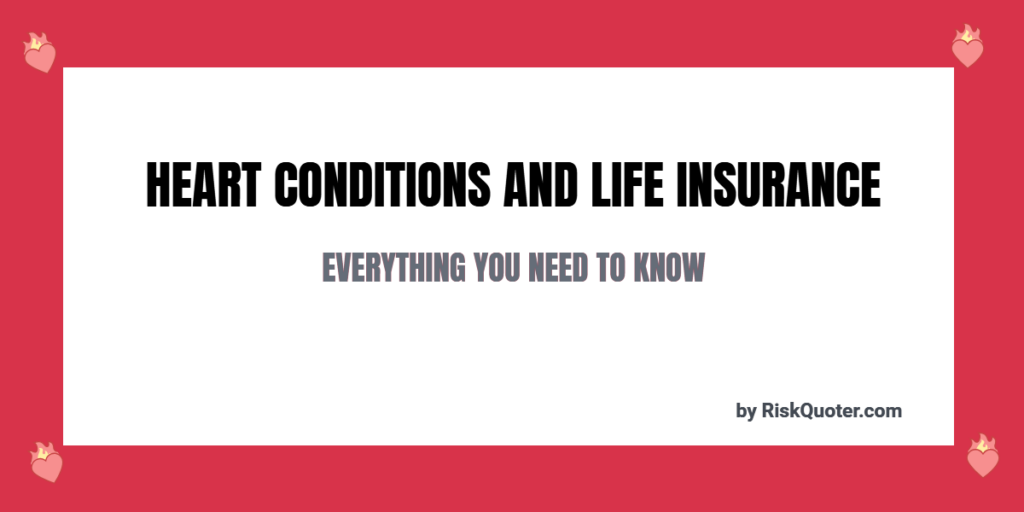Having a heart condition can make finding affordable life insurance challenging, but it’s far from impossible. Understanding how insurers evaluate high-risk heart conditions can empower you to confidently navigate the process and secure the necessary coverage.
Factors Affecting Life Insurance with a Heart Condition
When applying for coverage, life insurers consider several important factors:
Severity of the Condition
The seriousness of your heart condition greatly impacts your eligibility and premiums. More severe conditions may lead to higher costs or even denial of coverage.
Type of Heart Condition
The type, severity, and age at onset of your heart condition determine underwriting outcomes.
Conditions that tend to progress over time require longer postponement periods and more expensive ratings. You can counter that to some extent by following your doctor’s advice, improving your health where possible, taking your meds, and completing all follow-ups.
Treatment and Stability
Insurers favor heart conditions that are well managed through medication, treatments, or lifestyle changes. Stability over time often means better coverage and more competitive rates.
Time Since Diagnosis or Treatment
Some insurers require a waiting period after your diagnosis or most recent treatment to determine how your condition progresses and stabilizes.
It’s important that you complete all cardiac rehab and follow-up appointments before applying for coverage.
Overall Health
Your overall lifestyle—including smoking, diet, and exercise—plays a crucial role. Healthier lifestyle choices can significantly improve your chances of securing affordable life insurance.
Let us know if you have other medical conditions, such as diabetes, GI conditions, or chronic conditions,, as they affect underwriting.
Family History
A family history of heart disease may affect your eligibility and premiums, as insurers often use family medical history to assess your risk level. Cardiac family history is more of a factor than a history of cancer.
And when we say family history, we’re referring to your parents and siblings. Insurance companies are not concerned about your grandparents’ medical history.
Explore Specific Heart Conditions
Quickly jump to the heart condition that matters most to you.
- Heart Tests – Learn how cardiac testing impacts life insurance.
- High Blood Pressure – Find the best companies based on your BP history.
- Aortic Stenosis – Details life insurance underwriting for stenosis and aortic regurgitation.
- Atrial Fibrillation – Provides guidance for all types of AFib.
- Bypass Surgery – Covers bypass, angioplasty, and stents.
- Heart Attack – Learn how to get covered after a heart attack.
- Heart Blocks – Covers bundle branch blocks, AV blocks, and more.
- Pacemakers – How does your pacemaker affect life insurance rates?
- Cardiomyopathy – Find out how different types affect your life insurance.
- Mitral Valve Conditions – We cover mitral valve prolapse, regurgitation, and stenosis.
Life Insurance Options for Individuals with Heart Conditions
There are several life insurance options available to you:
Traditional Life Insurance
Traditional life insurance policies like term, universal, or whole life insurance are still available, though often with higher premiums or coverage limits based on your specific heart condition.
Guaranteed Issue Life Insurance
These policies do not require medical exams and are easier to qualify for. However, they usually come with higher premiums and lower coverage amounts.
This coverage is the last resort when nothing else is available.
How to Improve Your Chances of Securing Coverage
Several steps you can take to improve your chances.
Work with an Independent Agent
As independent agents, we specialize in high-risk life insurance and will match you with the best companies based on your heart health history. We’ll help you find the most suitable and affordable coverage based on your medical history.
Don’t Get Discouraged
If you were previously table rated or denied, consider reapplying after your condition has stabilized or improved. Insurers often reassess risk after a set period, potentially giving you better rates.
Sometimes it’s just letting more time pass, or reaching a milestone (2 years, 3 years, 5 years) after treatment to get favorable underwriting.
Final Thoughts
Having a heart condition doesn’t mean life insurance is out of reach. With the right guidance and understanding of your options, you can still protect your loved ones and achieve peace of mind.
Ready to explore your options?
Request your quote today! We’ll help you find the right coverage at the best rate for your unique situation.
